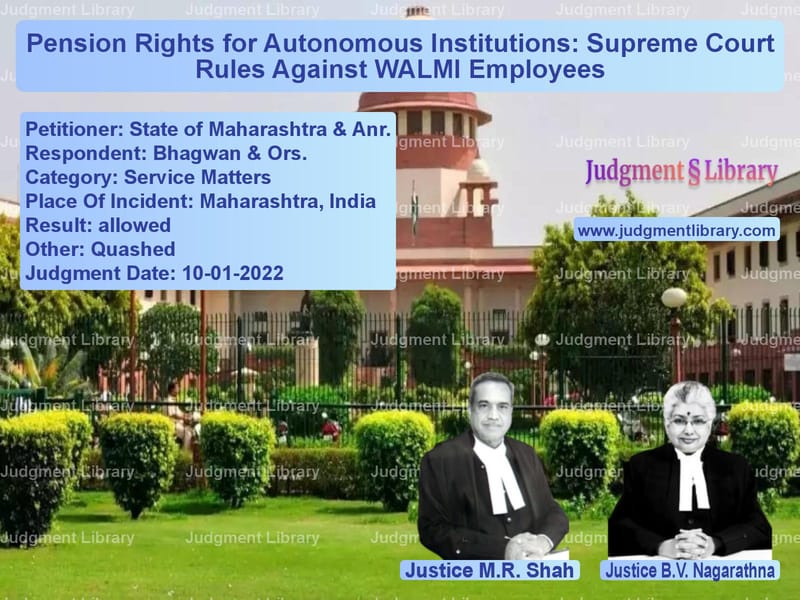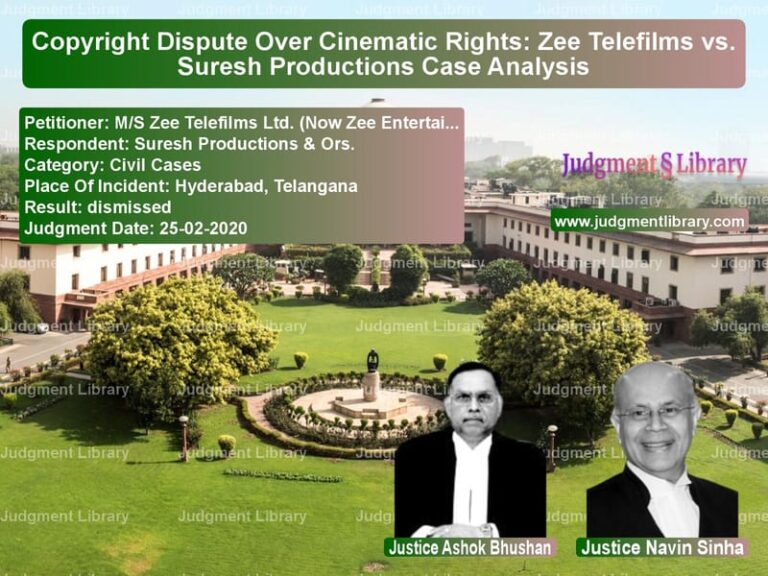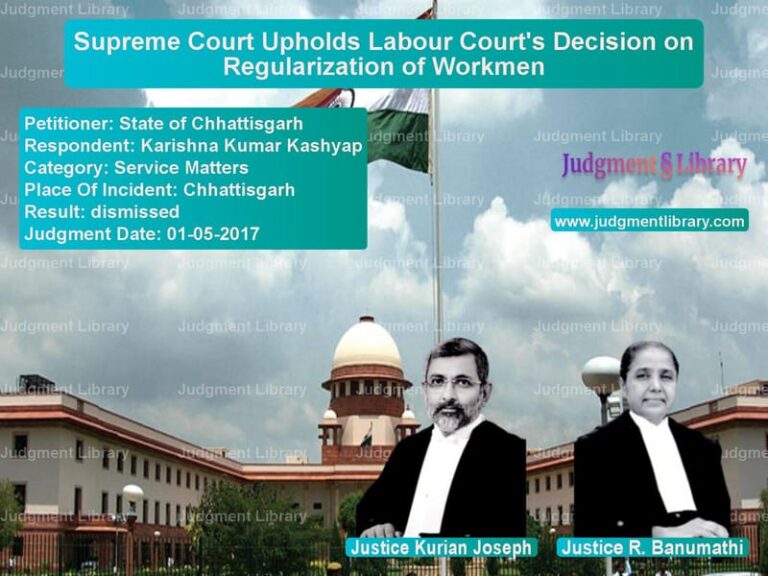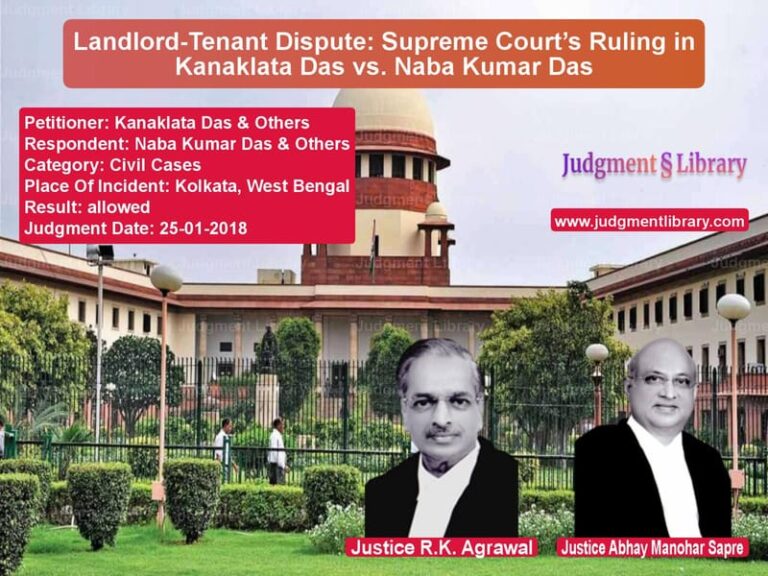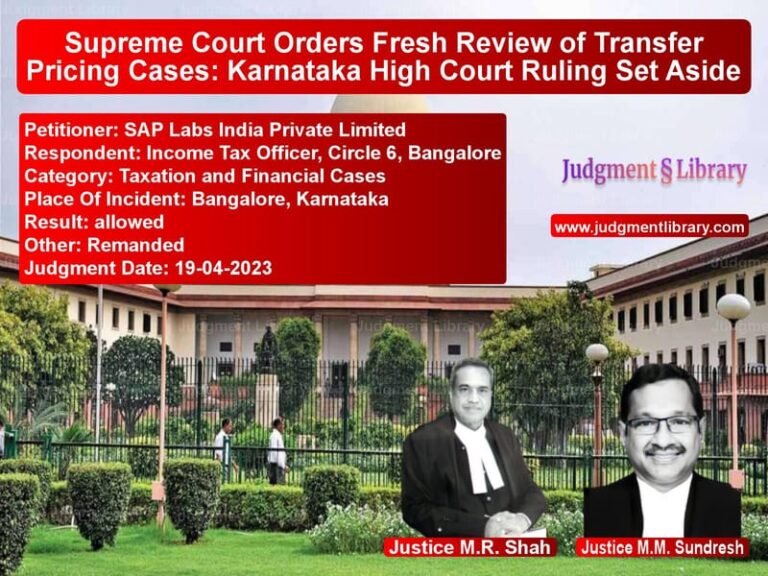Pension Rights for Autonomous Institutions: Supreme Court Rules Against WALMI Employees
The case of The State of Maharashtra & Anr. v. Bhagwan & Ors. and other related appeals deals with the question of whether employees of the Water and Land Management Institute (WALMI), an autonomous institution, are entitled to pensionary benefits on par with State Government employees. The Supreme Court ruled against the employees, setting aside the Bombay High Court’s direction to extend pension benefits to them.
Background of the Case
WALMI, established in 1980 under the World Bank Project of the Irrigation Department, is a society registered under the Societies Registration Act, 1860. It functions as an autonomous institution with its own Governing Council and service regulations. The key functions of WALMI include:
- Providing training in water management and land development.
- Conducting research and consultancy for government and other organizations.
- Collaborating with universities and academic bodies.
While WALMI followed Maharashtra Civil Service Rules in many aspects, it had a specific policy that excluded pensionary benefits. The dispute arose when WALMI employees demanded pension benefits, arguing that they were entitled to the same benefits as State Government employees because WALMI was fully funded by the State.
Arguments of the Appellants (State of Maharashtra)
- WALMI is an independent entity, and its employees cannot claim parity with State Government employees.
- The institute’s service rules explicitly excluded pension benefits, and only gratuity and provident fund rules were made applicable.
- A conscious policy decision was made in 2005 to deny pension benefits to employees of grant-in-aid institutions, including WALMI.
- The High Court’s direction to provide pensions ignored the financial burden and policy considerations.
- The employees were aware of the service rules at the time of joining and cannot later demand additional benefits.
Arguments of the Respondents (WALMI Employees)
- WALMI receives 100% funding from the State Government, making it an extension of the government.
- The employees have been following Maharashtra Civil Service Rules for other service benefits, so they should not be denied pension.
- The exclusion of pension was arbitrary and discriminatory, violating Article 14 of the Constitution (Right to Equality).
- Other autonomous bodies had been granted pension benefits, and WALMI employees should be treated similarly.
- The pension fund contributions and accumulated savings were sufficient to cover pension liabilities.
Key Observations of the Supreme Court
1. WALMI’s Independent Status
The Court emphasized that WALMI was registered under the Societies Registration Act and was an autonomous institution, governed by its own rules.
“An autonomous body cannot claim the same service benefits as government employees merely because it receives government grants.”
2. Validity of the Government’s 2005 Policy
The Court upheld the Maharashtra Government’s policy decision, which excluded pension benefits for grant-in-aid institutions.
“A policy decision taken after due deliberation cannot be challenged unless it violates fundamental rights or statutory provisions.”
3. Financial Burden Considerations
The Court noted that granting pensions to WALMI employees would create a significant financial burden, with recurring liabilities.
“Courts should not interfere in financial policy matters unless the decision is patently arbitrary.”
4. Precedents on Autonomous Bodies
The Court cited its ruling in T.M. Sampath & Ors. v. Secretary, Ministry of Water Resources, where employees of another autonomous body were denied pension benefits.
“Employees of autonomous institutions cannot automatically claim parity with government employees unless explicitly stated in service rules.”
5. High Court’s Overreach
The Supreme Court criticized the Bombay High Court for directing the State to provide pensions despite the explicit exclusion in service rules.
“Judicial intervention in policy matters should be limited, especially where financial implications are significant.”
Final Judgment
The Supreme Court allowed the appeals filed by the State of Maharashtra and held:
- The High Court’s order directing the State to provide pension benefits to WALMI employees is quashed.
- The employees of WALMI are not entitled to pensionary benefits on par with State Government employees.
- WALMI’s service rules, which exclude pensions, shall continue to apply.
- Courts should not interfere in financial policy matters unless there is clear constitutional or statutory violation.
Significance of the Judgment
This ruling reinforces key principles regarding employment benefits for autonomous bodies:
- Government-funded autonomous institutions do not automatically qualify for government employee benefits.
- Policy decisions regarding financial liabilities should not be overturned unless they violate fundamental rights.
- Courts must exercise restraint in interfering with government financial policies.
- Employees must abide by the terms of employment they agreed to at the time of joining.
This judgment sets a precedent for similar disputes involving autonomous institutions and their service benefits.
Petitioner Name: State of Maharashtra & Anr..Respondent Name: Bhagwan & Ors..Judgment By: Justice M.R. Shah, Justice B.V. Nagarathna.Place Of Incident: Maharashtra, India.Judgment Date: 10-01-2022.
Don’t miss out on the full details! Download the complete judgment in PDF format below and gain valuable insights instantly!
Download Judgment: state-of-maharashtra-vs-bhagwan-&-ors.-supreme-court-of-india-judgment-dated-10-01-2022.pdf
Directly Download Judgment: Directly download this Judgment
See all petitions in Pension and Gratuity
See all petitions in Public Sector Employees
See all petitions in Employment Disputes
See all petitions in Judgment by Mukeshkumar Rasikbhai Shah
See all petitions in Judgment by B.V. Nagarathna
See all petitions in allowed
See all petitions in Quashed
See all petitions in supreme court of India judgments January 2022
See all petitions in 2022 judgments
See all posts in Service Matters Category
See all allowed petitions in Service Matters Category
See all Dismissed petitions in Service Matters Category
See all partially allowed petitions in Service Matters Category

